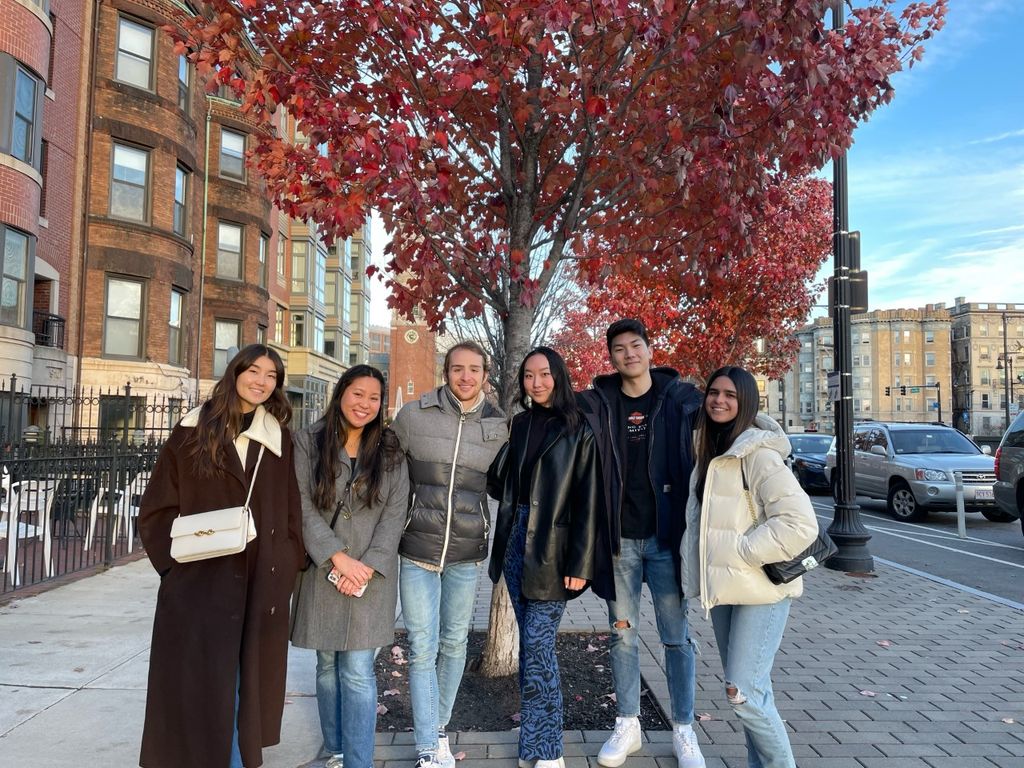Combating Online Disinformation
Students create a social media education program for middle schoolers
By Chelsea Feinstein
The Capstone project is a hallmark of the CGS experience. For four weeks in the spring semester, sophomores work in teams to complete a 50-page paper and oral defense that proposes a solution to a pressing problem. But for one group, whose project involved developing a social media education program for middle school students, Capstone has become more than just a school assignment.
After receiving a 2021 Capstone Award for their work, the team—Victoria Fernandez (’21, CAS’23), Katherine Harada Alcantara (’21, Questrom’23), Jason Miraka (’21, Pardee’23), Aruzhan Sarsenova (’21, Questrom’23), Ferren Winarto (’21, Pardee’23), and Yao Yao (’21, Questrom’23)—began collaborating with the Hopkinton Public School District to test their solution in the real world. They’re now working with the Massachusetts town to help its students better process and evaluate the veracity of what they’re seeing on social media, creating a series of videos that will supplement the middle school media literacy curriculum. Eventually, they hope the program becomes a model for social media literacy education nationwide.

Winarto says the project was partially influenced by divisions the group saw on social media in the lead-up to the 2020 presidential election.
“You’re being put in echo chambers, whether it be political or about COVID vaccines, or anything,” she says. “The overarching goal of our project is for people to be able to think for themselves, and so we want to go above and beyond the algorithm. We distrust these social media companies that are pushing these algorithms and data on us.”
The group chose to use a grassroots approach for their curriculum, based on the idea that middle school students would receive the message better if it came from someone close to their own age. While their original Capstone concept was built around high school students providing the training to middle school students, the pilot project has the Capstone group members taking on that role.
“It was us thinking of how our generation has grown up,” says Fernandez. “At the beginning, we didn’t have social media, and now we just go along with it. So we felt like we were the best equipped to teach the younger generation what are the dangers and how to see misinformation on the internet. It felt very personal.”
The group is spending the spring semester scripting, producing, and editing the videos. Their eventual goal is to evolve the program into one that is more interactive, providing high school students in Hopkinton with the materials to deliver the training to middle school students and create a dialogue.
The students’ work is being supported by the Social Impact Research Fund, a pilot program funded by Gary A. Kraut (’64, COM’66) that supports student-driven research (read more about the program and how it enabled one student to study the impact of microplastics on coastal environments). Hopkinton Public Schools Superintendent Carol Cavanaugh (CAS’87, Wheelock’90) says the BU students have brought a valuable perspective to the table.
“They are really invested in the project,” she says. “They’re very knowledgeable about it. And I just feel their passion.”
The group’s work is a testament to the power of Capstone, according to Dean Natalie McKnight.
“We need students who can go out into the world, research current problems, work collaboratively to find solutions, and then convince others to support their proposals. These are the fundamental skills that students demonstrate in Capstone, and they are the skills that employers are most looking for,” she says.
“They are also the skills that we will need to draw from in confronting global issues such as climate change, food and water shortages, and terrorism. The solutions we develop in dealing with these challenges will not come from isolated individuals working in a vacuum. They will come from interdisciplinary teams, researching and problem solving collaboratively, and speaking and writing persuasively to convince others to follow their ideas—just like our Capstone students.”